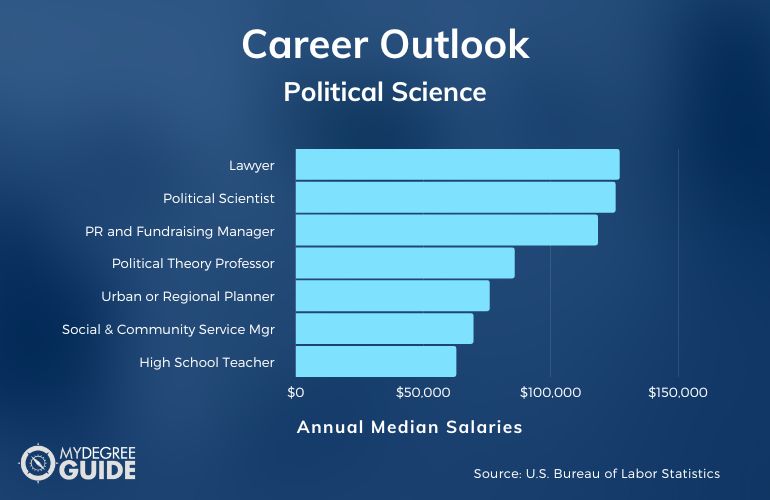What can you do with a political science degree? Political science careers include work in government, political campaigning and lobbying, teaching, nonprofit leadership, journalism, and public policy research and advocacy.

Editorial Listing ShortCode:
A bachelor’s in political science may open even more doors if you go on to get a masters or professional degree, which could qualify you to work as a professor, political scientist, or lawyer.
What Can You Do with a Political Science Degree?

If you’re interested in a career in politics, it may be a good strategy to use your political science degree as a stepping stone toward a higher degree or law school. Did you know that close to half of the members of the US Congress hold law degrees?
Other career options include jobs in local government planning, teaching, journalism, public relations, and social policy work. You may also become a political science policy analyst.
If you find yourself struggling to qualify for the best jobs or you want to explore alternate career options, you may find internships beneficial for resume-building, career exploration, and professional networking. You might even pursue internships while you’re still in school.
If you pursue an advanced degree in political science down the road, a masters or law degree may qualify you for postsecondary teaching jobs, for jobs with a law firm, or for research and analysis work in a number of settings.
5 Things You Can Do with a Political Science Degree

With a traditional or online bachelor’s in political science, you may qualify for some jobs right out of college. With additional work experience or education, you may pursue any number of intriguing careers.
Here are 5 popular pathways you may consider when thinking about political science jobs.
1. Political Scientist
Political scientists may work in government. You may research or consult on political systems or political trends, or you may perform public policy research, advocacy, and consulting work.
As a political scientist, you might also seek work in elected government. You may find yourself interacting with elected officials for campaign consulting, lobbying, or performing policy analysis.
2. Lawyer

Combining a political science degree with a professional degree in law is a strategic foundation for working as a lawyer, a legislative analyst, or as an elected lawmaker.
As a lawyer, you may also find yourself equipped for jobs in public policy and advocacy work in government or with a nonprofit organization. In regards to a political science background, you may be interested in civil law, civil rights, or social and public policy.
3. Public Relations or Fundraising Manager

As a political science major, you may use your developed understanding of public opinion trends and surveys to work in public relations or fundraising.
Working in public relations could mean supporting, advising, or managing a political campaign too. Roles in public relations or fundraising could involve creating campaign strategies and materials or conducting polls and doing public opinion research.
4. Teacher

Since both high school and college students are required to complete courses in government and civics, jobs in teaching can make great political science careers.
With a bachelor’s degree in political science and any necessary state or local licenses, you’ll typically qualify to be a high school teacher. An advanced degree in political science may qualify you to teach political science classes in community colleges or universities.
5. Journalist or News Analyst

As a political science major, you may develop insights into political systems and constitutional law as well as skills in writing, communication, and analysis. These insights and skills can translate into to a career in journalism.
In most cases, working in journalism means gathering and reporting news for a media outlet. These outlets include radio, television, magazines, political journals, or digital news outlets. Reporters often investigate news topics, find and interview news sources, and broadcast or write news reports.
Political Science Careers & Salaries

If you’re still wondering what to do with a political science degree, you might be surprised to discover the variety of jobs out there.
According to the Bureau of Labor Statistics, political science degree positions involve research and public policy analysis, law and politics, teaching, public relations, and public nonprofit leadership.
| Careers | Annual Median Salaries |
| Lawyer | $126,930 |
| Political Scientist | $125,350 |
| Public Relations and Fundraising Manager | $118,430 |
| Political Theory Professor | $85,760 |
| Urban or Regional Planner | $75,950 |
| Social and Community Service Manager | $69,600 |
| High School Teacher | $62,870 |
| Public Relations Specialist | $62,810 |
| Survey Researcher | $59,870 |
| Reporter, Correspondent, or Broadcast News Analyst | $49,300 |
Traditional or accelerated political science degrees not only offer a fascinating course of study but can also be your stepping stone to lucrative jobs in a range of interesting fields.
What Is a Political Science Major?

Majoring in political science means learning about theories of government and competing systems of government. Depending on your concentration, you may learn more about either the US constitution and systems of government or about foreign political systems.
Since a great deal of political theory has roots in philosophy and public advocacy, you will typically learn a lot about the ideological origins of competing political systems. You may also develop keen persuasive writing and debate skills.
What Do You Learn in Political Science?

As a political science major, you’ll be introduced to foundational branches of political science inquiry. This includes the study of US constitutional law, international relations, comparative politics, and political theory.
In your courses that cover the origins of different political theories and systems, you’ll often compare competing political ideologies and practices, such as democracy, communism, socialism, and fascism.
Your study of US politics will likely include insights into the history of the US Constitution, theories of democratic governance, the origins and role of the 3 branches of government, the role of political parties, and US political law and policy.
Is Political Science a Good Major?
Studying political science may help you understand the systems of political thought and government that impact so much of our lives.
There’s always demand for well-informed political science graduates. You may pursue a job as a policy analyst, legislative analyst, journalist, or news analyst. You may also qualify for government foreign service jobs or become a public relations manager, political science teacher, or elected lawmaker.
Should I Major in Political Science?

You may decide to pursue a bachelor’s degree in political science if it fits with your personal interests and career goals.
A bachelors in political science may be a good fit for you if you’re excited about social policies or political philosophy. Political science also entails theoretical and verbal analysis as well as political debate.
If you want to build a career in government, the foreign service, or in researching or teaching political science, then this may be a beneficial major for you to consider.
What Jobs Can You Get with a Political Science Degree?

If you’re wanting to apply to jobs for political science majors right out of college, then you may find positions in government offices or in certain nonprofit organizations or NGOs.
High school teaching positions may also be an option for you upon graduation, but some additional licensing steps are often required. For some positions, getting started as an intern while you’re still in school can be a helpful way to improve your odds of finding a job later on. These may include positions in public relations and campaign work.
You may also seek internships if you’re interested in support work for a legislator or lobbying. Many political science majors go on to law school to qualify for a law career or pursue political ambitions.
If you’re interested in teaching political science as a college professor or working as a political scientist, you’ll often need an advanced degree.
How Much Do Political Science Majors Make?

Entry-level political science degree jobs in teaching, nonprofit work, local government, or public relations are likely to earn an average of $45,676 (National Association of Colleges and Employers). An advanced degree in political science or a professional degree in law may open doors to even more jobs and higher earnings.
If you are working as a lawyer, policy analyst, college teacher, political consultant, fundraiser, or manager in public relations, you should easily earn far more than $50,000 (Bureau of Labor Statistics). In some cases, you may earn upwards of $100,000.
What Do Political Science Majors Do?
As a political science major, you’ll learn about lawmaking, political institutions, legislative policy, political trends, and public opinion. You’re also likely to develop proficient communication skills.
You might apply your knowledge and advocacy skills in local government work or in the public nonprofit arena. You may conduct public opinion survey analysis for political campaigns or public relations firms.
Some political science majors will go on to get a professional law degree. You may also pursue a masters degree to qualify for more positions, including postsecondary teaching jobs or leadership roles in policy analysis or advocacy.
As a political science major, you might also develop a career in journalism, work for a political party, or seek elected office.
Is a Political Science Degree Worth It?

Yes, a political science degree is worth it for many students. The Bureau of Labor Statistics is projecting 5% job growth in life, physical, and social science occupations over the next 10 years, faster than the average for all occupations.
Common political science careers in this field include lawyer, political scientist, teacher, policy analyst, or public relations and fundraising manager.
As a political science major, you may qualify for a range of jobs in public relations, political advocacy, teaching, and journalism. You may also be well positioned for pursuing a professional degree in law or public policy.
Getting Your Political Science Degree Online

An online bachelors in political science may lead to strategic internships and entry-level jobs in a range of exciting settings and fields.
There are political science positions in the fields of business, government, teaching, public relations, social policy, and more. A political science degree may also act as a foundation for professional or advanced degrees that may qualify you for higher paying careers.
If you are interested in studying areas of law, government, and political institutions, then you may want to consider exploring accredited online political science programs to find the one that best fits your personal career goals.
